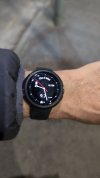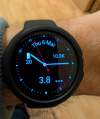I'm 61, newly diagnosed and just starting to come to grips with the funny eating.
Before RH was suspected, I had several weeks of a very low exercise tolerance (getting exhausted and breathless after 15 minutes of walking, and swimming totally out of the question).
It is starting to slowly, very slowly get better now. I am currently able to walk 30 minutes at a time, or up to a total of 60 minutes of walking a day in instalments. Or I can do half an hour of gentle pilates.
I would like to get back to at least 8000, ideally 10000 steps a day, three one-mile swims (front crawl, medium to fast lane) per week and the odd round of golf or bike ride. Plus pilates or tai chi three times a week.
At the moment, I don't see how I will manage the swimming with RH, which makes me sad. I used to – as recently as the summer – have dinner at 6 or 7 pm, sleep, get up at 6am, walk to the pool before breakfast, start my swim at 7 am, and be home having a big breakfast at 8.30.
At the moment, I am having a one-egg omelette with a small salad at 3.30 in the morning, get up at 6 and then have to eat again at 8 am.
I can currently just about imagine trying a tiny swim in the middle of the day, one hour after eating and one hour before eating.
Without swimming, my cardiovascular fitness will decline (and I will get more backaches). Mornings have always been my best time to swim, because I can feel my stomach being full even if I ate an hour ago.
My understanding is that the low exercise tolerance stems from my body not being able to get enough energy out of carbs/sugar, and it's harder to get energy out of protein and fat.
Has anyone on this forum managed to get back to their normal exercise levels after being hit by RH? Thanks in advance!
Before RH was suspected, I had several weeks of a very low exercise tolerance (getting exhausted and breathless after 15 minutes of walking, and swimming totally out of the question).
It is starting to slowly, very slowly get better now. I am currently able to walk 30 minutes at a time, or up to a total of 60 minutes of walking a day in instalments. Or I can do half an hour of gentle pilates.
I would like to get back to at least 8000, ideally 10000 steps a day, three one-mile swims (front crawl, medium to fast lane) per week and the odd round of golf or bike ride. Plus pilates or tai chi three times a week.
At the moment, I don't see how I will manage the swimming with RH, which makes me sad. I used to – as recently as the summer – have dinner at 6 or 7 pm, sleep, get up at 6am, walk to the pool before breakfast, start my swim at 7 am, and be home having a big breakfast at 8.30.
At the moment, I am having a one-egg omelette with a small salad at 3.30 in the morning, get up at 6 and then have to eat again at 8 am.
I can currently just about imagine trying a tiny swim in the middle of the day, one hour after eating and one hour before eating.
Without swimming, my cardiovascular fitness will decline (and I will get more backaches). Mornings have always been my best time to swim, because I can feel my stomach being full even if I ate an hour ago.
My understanding is that the low exercise tolerance stems from my body not being able to get enough energy out of carbs/sugar, and it's harder to get energy out of protein and fat.
Has anyone on this forum managed to get back to their normal exercise levels after being hit by RH? Thanks in advance!



